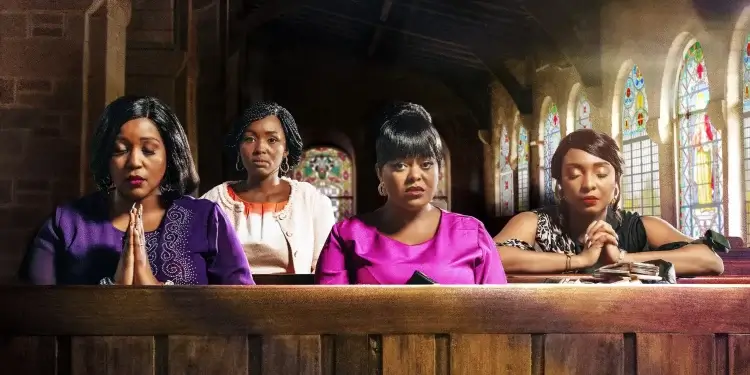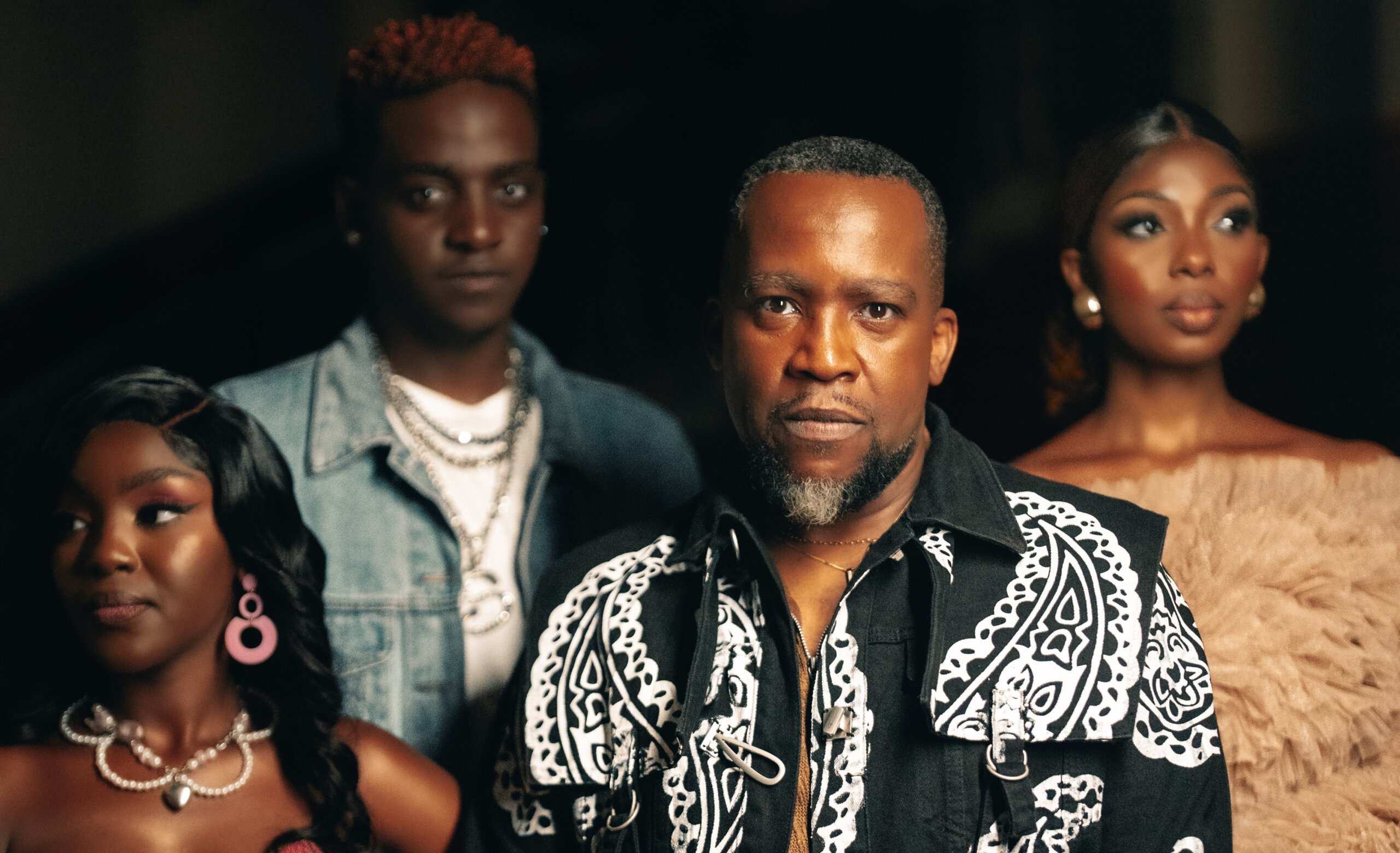“I don’t know if I should be proud of you or disappointed.” These words uttered by Cain (Aleks Kamau), the villain in Faithless, the Showmax Original crime drama sums up most of my feelings towards this show. Proud that the premise of four church faithful women stumbling on a load of dirty money could string together a season’s worth of drama and intrigue, but disappointed that though great effort was made to grab hold of the diminishing attention of its audience on a week-to-week basis, the resulting narrative feels way too disjointed, lumbersome, and uninspired to stand out from its countless peers within the genre.
The first three episodes set up the pieces of the story, careful enough to balance the divinity of the church and its congregants with the cruelty and brutality of the crime underbelly. Menacing enough to kill off central characters early on and gentle enough to show the church as a healing ground for the community, Faithless begins with the promise of intent. On one side, the four women are introduced with tragedy befalling Esther (Rosemary Waweru), who, with the motherly guidance of the church matriarch, Ruth (Beatrice Mwai), and the support of their friends Deborah (Avril Nyambura) and Hope (Fatma Mohammed), nurse her through her grief. Except for Ruth’s mistrust of her husband, Pastor Musa (Arabron Nyyeneque), personal lives take the back seat as the four women with four differing personalities, united under the sanctimony of their faith and the activities of their church sacco, debate what to do with their newly found money and the repercussions of their actions. On the other side, Cain, a meticulous and brooding criminal king who rules with a firm iron fist, merciless even to his own kin, is keen to grow his criminal empire and satisfy the whims of his beneficiaries, eyed by a skilled detective waiting for him to slip up. This dichotomy, perfect enough to be a feature film on its own, sets off the events of the season.
If one were to skip the next four episodes and watch the last three, one would find completely changed characters, and in every other circumstance, that would be a good thing. After all, characters are supposed to change. For Faithless, however, these changes are in no way organic and border on inconsiderate writing. Ruth, a character overwhelmed with guilt at the end of one episode, walks to a police station to confess, and by the next, she has fully self-actualized an interest in and skill to run a money laundering scheme. An estranged Esther’s personal fight out of her grief, guilt, and alcoholism gets little to no screen time before she is thrown back into the centre of the narrative. Hope’s defiant nature slowly withers against the robotic and blank caricature of her husband. And Deborah, almost lost for a place in the story, is deflected into an unnecessary slimming tea scam when she hasn’t shown any self-consciousness about her body or her husband’s affection before, which proves inconsequential in the end. Even Cain, set up to be careful and callous, allows an already proven liability – his son Jonah (Morris Mwangi) – to run around within his organisation, compromising it from the inside against the better judgment of his right hand (played by Abubakar Mwenda). There is almost a feeling the writers had a concrete idea of where to start and where to end, but very little of the middle, throwing inconsequential plotlines around, overstretching scenes, overusing flashbacks, and debilitating characters until their part to push the narrative forward arrives.
At its best, Faithless pits its characters morality against each other, opening the door for heart-wrenching arguments over the different facets of right and wrong. All my favourite moments of the show come when husband and wife, criminal and criminal, mother and motherless, standing on the same moral side, find cause for disagreement. These moments, however, are scarce and far spread out through the course of the series to build up the tension that would make the episodic cliffhangers harrowing.
Juggling between the lives of four characters and their immediate associates, the inner workings of the criminal organisation, and the prolonged police investigations weaving between them, ten one-hour episodes could be excused as merely not enough to properly tell this particular story in its entirety. Then again, there are a lot of redundant scenes and a deficiency of intelligent dialogue or sparking repartee that waste away moments to build on the plot at hand. A love interest is stirred out of the blue by characters who barely gave each other a second glance beforehand, and the story drifts from children’s homes to stripper joints to golf courses just to pad up the runtime, wasting away the talents of seasoned actors like Raymond Wafula without giving them a well-crafted back-and-forth conversation scene to show off their oratory prowess. A lot of wasted opportunities. What’s surprising is that there’s more than one occasion where the faults of the narrative are brought up by the characters themselves. They question their motives, their inconsistent arcs, and the predictable nature of their plotlines, almost as if awareness alone is an excuse for their shortcomings.
On the technical side, with the exception of a few acting hiccups, the production and performances are of the quality that Showmax Originals have been known to produce on a consistent basis over the years. The action scenes, limited in stunts and effects, add to the thrill without distracting. The show goes above and beyond to even add some visual effects for a nightmare montage and rigged wire stunts for the added effects of gunshots and high drops that I can’t help but laud. The cinematography captures the balance between the spacious space within and around the church and the eerie tones of the criminal havens, and I thoroughly enjoyed the brooding demeanour Aleks Kamau brought out in Cain for every scene he was present.
Dip into the same shallow well often enough, and inevitably it will begin to run dry. This appears to be the case with Faithless. Flirting with deviating themes of religion, family squabbles, money laundering, and crime syndicates, to name a few, but like a lot of good but not great Kenyan shows, the lack of depth into any of these themes past the point it becomes more than as instrument to pass the runtime will continue haunting our shows as mere background dramas with no replayability. One finishes shows like The Wire and feels like they understand institutionalised crime; one finishes Ozark and feels like they understand money laundering; or one watches Breaking Bad and feels they are witnessing the true scale of moral corruption. The same cannot be said of Faithless, a show that deals with the same cards but squanders them for all the looks but not enough of the feels.
Faithless S1 is available to stream on Showmax.
Enjoyed this article?
To receive the latest updates from Sinema Focus directly to your inbox, subscribe now.











